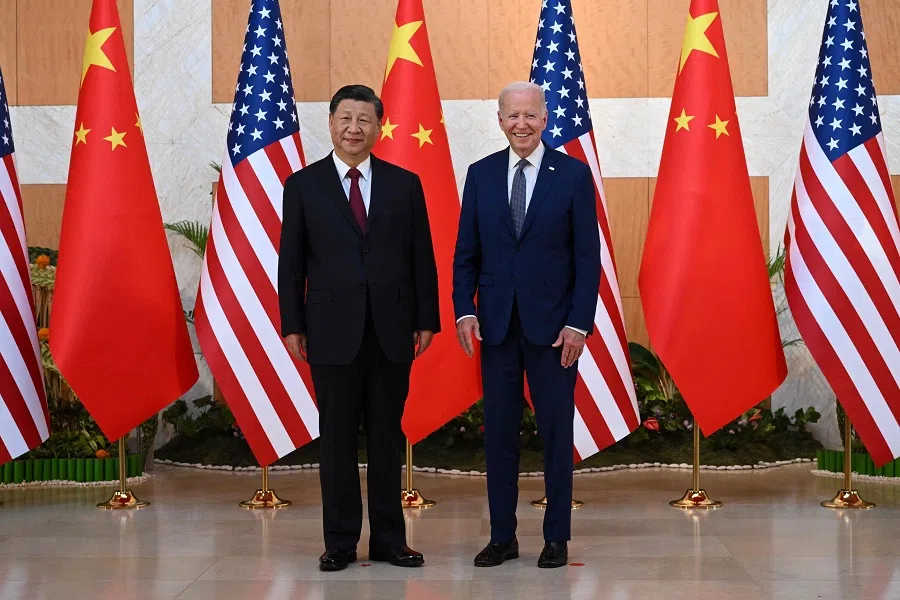Israel-Hamas war testing credibility of China's Middle East strategy
Amid China's diplomatic efforts such as a visit to Beijing by Arab and Islamic countries this week, the Israel-Hamas war is bringing about a much-needed reality check on China's ambitions in the Middle East, says Jean-Loup Samaan, a senior research fellow at the Middle East Institute, National University of Singapore.

Until the gruesome attack launched by Hamas on 7 October against Israel, the Middle East was seen as the new battleground for influence between the US and China. The region had long been shaped by US policies but in the last decade, things changed. Local countries started welcoming Chinese investments, be it in their local infrastructures such as port facilities or the development of 5G networks.
Arab rulers looked at Xi Jinping's Belt and Road Initiative as a major opportunity to modernise their economies. Meanwhile, Washington, exhausted by two long wars in Iraq and Afghanistan, expressed its desire to reduce its regional footprint. In March 2023, the revelation of a China-brokered agreement between Saudi Arabia and Iran suggested that the Chinese Middle East policy was now more than business investments. Beijing had gained the diplomatic clout to act as a mediator among old enemies in the Persian Gulf.
... Beijing's strategy has stayed driven by a mercantilist belief: making business deals with everyone - from Israel to Saudi Arabia, and Iran - would enable prosperity in the region and eventually ensure its stability.
Mediator limitations laid bare
Altogether, this stirred debates regarding the possibility of China challenging US primacy in the Middle East. These speculations vanished though, as soon as the war between Israel and Hamas started.
In the aftermath of the Hamas assault, Chinese diplomatic statements followed a familiar pattern. They emphasised neutrality, while calling on both sides to exercise restraint. They repeated China's peace plan that was announced most recently during a visit by Palestinian President Mahmoud Abbas to Beijing last June. At the time, Abbas's trip was read as an indication of Chinese ambition to play a mediating role in resumed peace talks. China's absence in today's crisis questions such a prospect.
The fact that China refrained from condemning Hamas for the assault on 7 October deeply angered the Israeli government. But it should not have come as a surprise: since the 1950s, China's attitude towards the Israel-Palestine conflict has been consistent, and Beijing has traditionally looked at the dispute as a struggle for Palestinian emancipation against Western-backed Israel.
Back in 1965, Mao stated that "Israel and Taiwan are bases of operation for Imperialism in Asia. They created Israel for the Arabs and Taiwan for us. They both have the same objective". The anti-colonial approach of China towards Israel was later toned down as economic relations between both countries burgeoned. Bilateral trade went from US$50 million in 1992 to US$11 billion in 2016. Chinese companies are involved in most sectors of the Israeli economy: agriculture, ports and train infrastructure, as well as cybersecurity.

But commercial ties did not truly transform the Chinese approach to Israel, and more broadly to the Middle East. All along, Beijing's strategy has stayed driven by a mercantilist belief: making business deals with everyone - from Israel to Saudi Arabia, and Iran - would enable prosperity in the region and eventually ensure its stability. Meanwhile, China constantly refrained from meddling in regional disputes.
...beyond trade, China has neither the means nor the willingness to play a strategic role in the region.
'Business-first approach' may no longer work in the Middle East
For a while, this business-first approach worked. It created a zero-enemy policy which enabled China to carry the Saudi-Iranian agreement forward last March. The US could not have done that. In the past three years, that Chinese approach was also successful because local powers too were trying to emphasise economic cooperation, instead of military competition.
During that period, the Middle East witnessed an unprecedented wave of reconciliation and rapprochement: in 2020, Israel signed new normalisation agreements with four Arab states (UAE, Bahrain, Morocco, Sudan), a year later, Saudi Arabia lifted the three-year blockade of Qatar and mended ties with Turkey.
Now, the resurgence of the Israeli-Palestinian conflict challenges the basic assumptions behind China's business-first approach. It suddenly highlights that beyond trade, China has neither the means nor the willingness to play a strategic role in the region.
If the current conflict is the worst Middle Eastern crisis since the Yom Kippur War in 1973, the comparison is revealing: 50 years ago, both the US and the USSR played a central role in forcing an end to the conflict. China today neither has the influence on Iran or Hamas that the Soviet Union had on Egypt and Syria, nor does it want to play that role.
In fact, as Tehran escalates tensions through its proxies in Yemen, Lebanon and Iraq, this could also lead to a worsening of Gulf-Iran relations. The resumption of tensions in the Persian Gulf would then challenge the credibility of the Saudi-Iranian deal brokered by China.
Beijing's reluctance to get involved in the crisis only proves that beyond business ties, it has no desire to replace the US as the "gendarme" of the Middle East.
US not the beneficiary either
That said, the fact that China's Middle East policy shows its limitations today does not mean that US influence is getting stronger. Looking at the great power competition in the Middle East as a zero-sum game is misleading.
Admittedly, the administration of President Biden demonstrated that the US is the only country able and willing to deploy an impressive amount of military power to the Middle East: two American carrier strike groups, a guided missile submarine, an amphibious-ready group with an embarked Marine Expeditionary Unit, Air Force fighter squadrons and Army air defence units were sent to the region. In addition, 2,000 US soldiers have been on "24-hour prepare-to-deploy" orders since the war began.

But because the US remains the only consequential global power in the current conflict, it is also seen as the one bearing the responsibility for the outcome. President Biden often says that the world is at "an inflection point", but everyone is now watching if Washington can find a way, not only to prevent regional escalation, but to take the lead in a new regional peace process. As of yet, the odds are not in its favour.
Beijing might be calculating that involvement in the current conflict is doomed to fail. Letting the US own the regional crisis would therefore be the best course of action. Under these circumstances, China's hands-off approach could reap a profit. But anger in the Arab world towards the Americans because of Washington's support to Israel does not mean that local rulers will be eager to get closer to China.
Beijing's reluctance to get involved in the crisis only proves that beyond business ties, it has no desire to replace the US as the "gendarme" of the Middle East. This may evolve over time: for several years, there have been speculations that the Chinese navy is seeking access to Gulf ports, either in the UAE or most recently in Oman. But for the time being, the war brings about a much needed reality-check on China's ambitions in the Middle East.



![[Video] George Yeo: America’s deep pain — and why China won’t colonise](https://cassette.sphdigital.com.sg/image/thinkchina/15083e45d96c12390bdea6af2daf19fd9fcd875aa44a0f92796f34e3dad561cc)
![[Big read] When the Arctic opens, what happens to Singapore?](https://cassette.sphdigital.com.sg/image/thinkchina/da65edebca34645c711c55e83e9877109b3c53847ebb1305573974651df1d13a)
